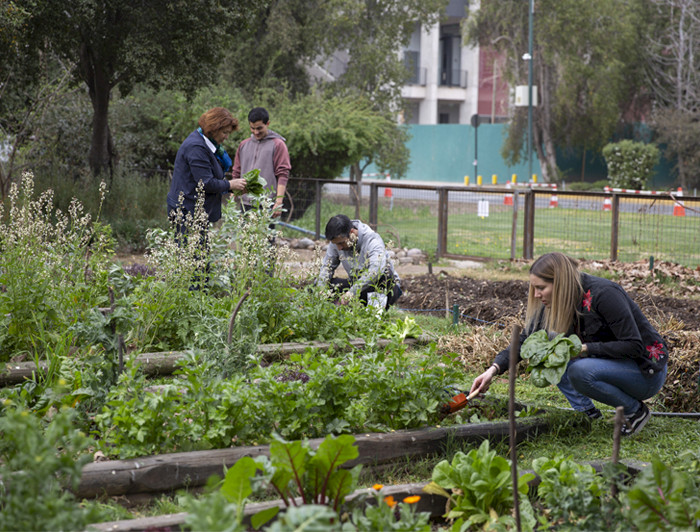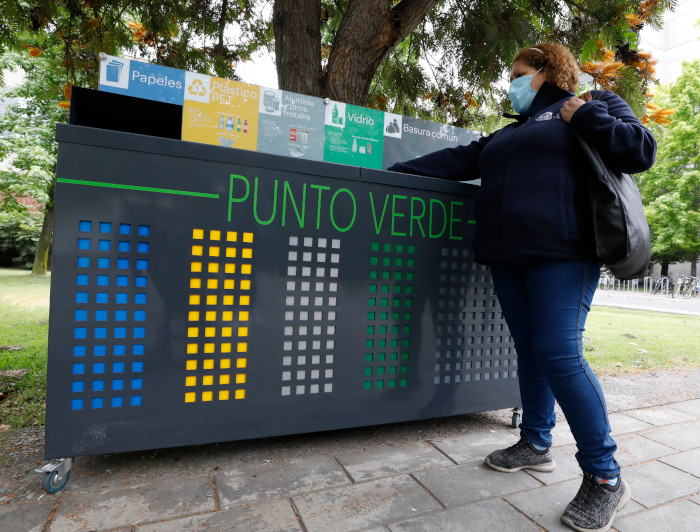
UC Sustainability Report: Advances, Projects, and Commitments
As humankind, we are at a pivotal moment to face the various socio-environmental problems that affect us. In this scenario, Pontificia Universidad Católica de Chile (UC) has been making efforts to provide solutions regarding education, culture, research, and sustainability management. This fourth UC Sustainability Report shows the advances, projects, and commitments carried out during the 2018-2019 period.

photo_camera The report has been prepared following the Global Reporting Initiative (GRI) Standards: Universal Standards, which represent global best practices for publicly reporting an organization's economic, environmental, and social impacts. (Photo: San Francisco Vegetable Garden)
Within a country, universities play a decisive role in their contributions to the development of knowledge and society's common good. The current socio-environmental crisis humankind is facing presents significant challenges for the University.
Our sustainability efforts as Universidad Católica are focused on:
- education,
- research,
- contribution to the country,
- culture,
- management.
For decades, faculty members, researchers, professionals, directors, and students have carried out these efforts. Since 2013 they have been outlined in the biannual Sustainability Report.
The document seeks to establish a diagnosis to detect challenges, opportunities, and goals to grow and install a sustainability culture, in all its dimensions, in our University.
This fourth UC Sustainability Report gives an account of the work done during 2018-2019. It also reflects the progress, projects, and commitments to respond to Pope Francis' call in the encyclical Laudato Si': to care for our common home.
Towards a Sustainable UC
The report has been prepared following the Global Reporting Initiative (GRI) Standards: Universal Standards, which represent global best practices for publicly reporting an organization's economic, environmental, and social impacts.
The UC 2018-2019 Sustainability Report looks at these three aspects in all five of its campuses: Casa Central, San Joaquin, Oriente, Lo Contador, and Villarrica.
According to the University President Ignacio Sánchez, our university "has committed itself to promote sustainability not only in the operation of its campuses, but also in teaching, research, and creation, and its public commitment to the country."
Provost Guillermo Marshall explained that this Sustainability Report had been structured in chapters closely related to the University's work:
- Community and Culture of Sustainability,
- Education of People,
- Generation of Frontier Knowledge for Sustainable Development,
- Public Commitment and Community Engagement,
- Management for Sustainable Campuses.
"In this report, we give greater visibility to those research centers that are more directly related to sustainability. But we also plan to make the great contribution made by the faculties more visible in future reports," said Maryon Urbina, Office of Sustainability Director.
In terms of Community and Culture of Sustainability at UC, a university's co-construction safeguards good living within the institution. We need to ensure inclusion, gender equity, safety, health and quality of work, student and family life, and environmentally sustainable habits adoption.
Initiatives such as the Smoke-Free Campus and the Green-Office Program prove our community's commitment. We are transforming our common spaces into living laboratories that can permeate the day-to-day life at UC with sustainable habits. Our University seeks to educate people with the skills, knowledge, and fundamental values to face future challenges. Challenges that emerge from the various facets of the socio-environmental crisis our planet is facing.
The inclusion of sustainability in the general education plan is a clear sign of this commitment. We are incorporating the attribute of promoting integral ecology and sustainability into the University's graduation profile, as in all aspects of its work.
This decision goes hand in hand with creating the UC Sustainability Lecture to consolidate sustainability in education and research. The hope is that this effort will soon play a transformational role in the University in teaching, research, and public commitment.

Sustainable Development and Community Relations
At UC, sustainability research is conceived as a privileged space for collaborative, interdisciplinary, and transdisciplinary work. The investigation must respond to the critical mission of providing solutions to make our way of living on the planet sustainable.
One of the projects is to carry out the first categorization of papers to create a diagnosis regarding the University's effectiveness in different sustainability areas within the Sustainable Development Goals (SDGs).
These efforts are in addition to the work done by our University's research centers, which provide solutions for sustainable development.
In the field of knowledge transfer and contribution to public policies, UC has sought to contribute to the national agenda, COP25, and the country's commitments through scientists' participation in the COP25 Scientific Committee. However, the University's collaboration and participation extend beyond the scientific disciplines. It also contributes to the area of culture and the arts.
UC 2018-2019 Sustainability Report shows the commitment adopted last year to 3become a carbon-neutral university by 2038.
The document also reveals all the advances made within our campuses in various areas such as transportation, energy, water, and waste, to achieve internal coherence within our campuses with sustainability, specifically reducing our CO2 emissions.
"The challenge is to make a cultural change within our institution, which soon will allow the University to influence and permeate at a national level. This is a global and sustainable goal, to which we must aspire through a quality university project," concluded President Ignacio Sánchez.
*We invite you to review in detail all the commitments, projects, and advances in the fourth UC Sustainability Report (in Spanish).


